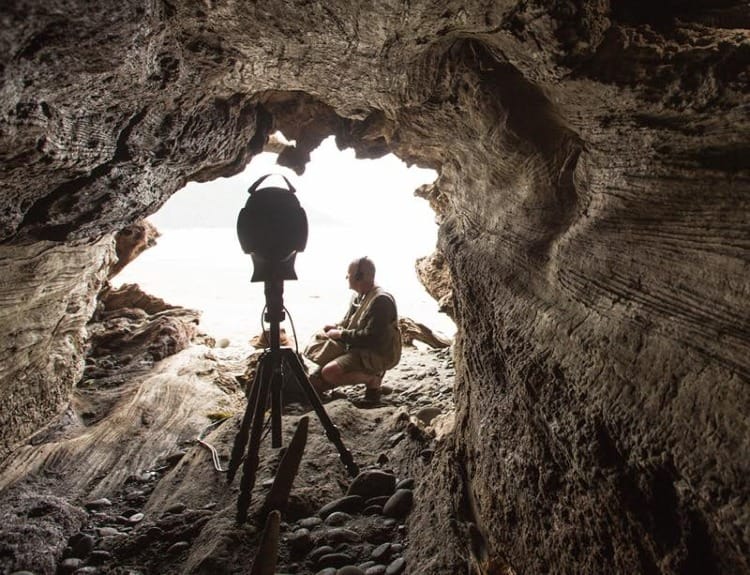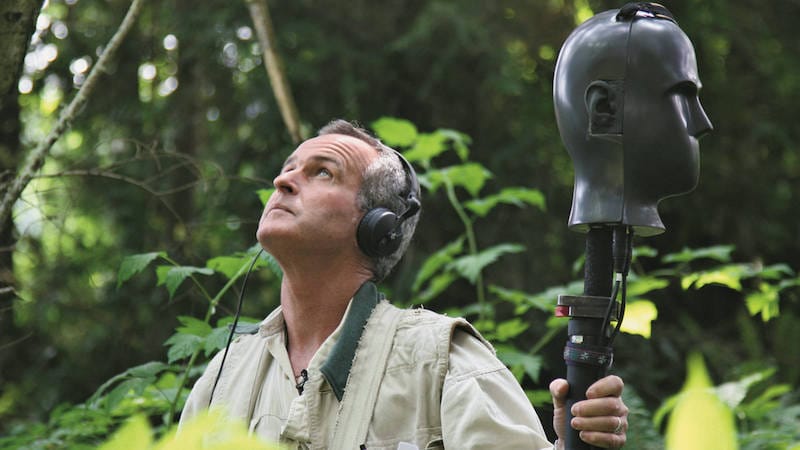In a world where noise is pushing into all the corners of the world, acoustical ecologist Gordon Hempton advocates for the preservation and protection of listening and silence. By recording sounds such as the wind blowing through a driftwood log and a bird chorus in Costa Rica, he highlights natural sounds that are usually buried underneath the noise that humanity fills the world with.
His definition of silence is not absolute soundlessness. He said in an interview with Krista Tippett of On Being,
When I speak of silence, I often use it synonymously with quiet. I mean silence from modern life, silence from all these sounds that have nothing to do with the natural acoustic system, which is busy communicating; wildlife is as busy communicating as we are.
One Square Inch of Silence
One place where Hempton has made many recordings is in the Hoh Rainforest of the Olympic National Park, a couple of hours away from where I live. In 2005, Hempton hiked to a spot deep within the rainforest, carrying a stone given to him by a member of the Quileute Tribe, placed the stone on a log he found there, and dubbed the spot "One Square Inch of Silence."
Hempton raised awareness of both the importance of silence and the threats it faces by bringing this rare place of deep quiet to the public notice through his recordings and advocacy, persuading airline companies and the National Park Service to limit their noise-creating activities in the area. By creating awareness around this particular "square inch of silence," Hempton hoped to both protect this particular place from noise pollution and also begin a movement of quiet that might grow and blanket larger areas of the earth.
This kind of "silence" is more than endangered, he says. It is nearly extinct.
He calls spots such as this place in the Hoh Rainforest the "last great quiet places," with only 12 such spots in the United States. The requirement to be labelled one of these "last great quiet places" is a noise-free interval of 15 minutes or longer during daylight hours, meaning no overhead jets, no far-off highway noises, no cell phone ringing, no sounds of machinery.
For years, Hempton's efforts at protecting the Hoh Rainforest from noise had some effect; he was, for example, able to persuade airlines to steer their training and maintenance flights away from the park. But in the last few years, the naval base on nearby Whidbey Island upped its flights of Growler jets over the area and now there is a ground-shaking roar from the fighter jets which pass overhead six times a day.
As a result, Hempton's vision shifted. Instead of concentrating on this particular "inch of silence," Hempton decided to spread the message of the value of silence to the broader world. One outcome was the founding of Quiet Parks International, a non-profit that aims to certify and preserve the Earth's natural soundscapes through "quiet tourism," which creates experiences centered around encounters with auditory quiet.

The Importance of Listening
The experience of quiet is tied directly to the ability to appreciate quiet and the ability to listen. Hempton differentiates between listening for something in particular and listening without a particular aim in mind. Real listening, he says, is being open to whatever we hear, not being focused on a particular purpose or goal— not listening for something, but just opening ourselves up to the experience of hearing whatever happens to be present. This sort of "aimless" listening is how we can be a creature among other creatures. It is how we learn and expand.
As he said in the On Being interview, he was 26 before an experience in which he truly listened for the first time. "I realized that I had a whole wrong impression of what it meant to actually listen. I thought that listening meant focusing my attention on what was important even before I had heard it, and screening out everything that was unimportant, even before I had heard it. In other words, I had been paying a lot of attention to people, but I really hadn’t been paying a lot of attention to what is all around me. And it was on that day that I really discovered what it means to be alive as another animal in a natural place."
Listening to where we are connects us to it in the same way that listening to another person connects us to them. If we never listen to anything but human created noises, we will never hear the other voices that are around us and we will remain unconnected to them. Listening without an agenda means being open and curious, not having a particular agenda or plan, just experiencing what is around us as it comes to us.
The Practice of Quietness
Places of quiet can help us learn how to listen. With the loudest sounds absent, we can hear the quieter sounds that trickle underneath.
Hempton has said that he sets aside a time of silence every day.
I take a moment of silence, every day in my life, that I don’t try to fill with thoughts, that I turn everything off — and sometimes that even means going over to the master breaker switch on the wall and clicking that. And I know that other people might have other ways of saying it, but that’s what sounds right to me. There’s no purpose, but there’s a great deal of joy. I’m then able to go out into the day.
By taking away the pressure of accomplishing something, real, deep listening opens us up to what is outside of us, allowing other voices and input to enter into us, rather than being pressured to produce a response or answer.
The recording above is an opportunity to experience a bit of a quiet retreat, a four-minute venture into the Hoh Rainforest with Hempton as a guide. If you don't already know the luxury of dwelling in quiet and allowing yourself to drift with the quiet sounds that happen your way, perhaps this taste will make you hungry for more of the experience. In addition, I would encourage you to go outside, find a quiet place, and allow yourself to bask within the quiet sounds that rise up around you. Just allow yourself to be tuned to the sounds you find there. If you have an encounter with quiet you would like to share, we would love to hear about it.

Gordon Hempton recording in the Hoh Rainforest.
To learn more about Gordon Hempton, visit his website here. To hear his complete interview with On Being, click here.
A Last Invitation
A couple weeks ago, I invited readers to send in brief stories and pictures of your own experience with gardens that can be shared with other readers. How has a personal or community garden built bonds between you, other people, and other creatures? In your experience, how have you seen land, food, and place create community connections in your life? Send in your picture and/or brief story (100 words or less) by October 1 and we will include them in a special "readers share" post.
Feel free to leave a comment below (you can sign in through your email) or contact me directly at louise.conner@circlewood.online.
Louise
Want to learn more?